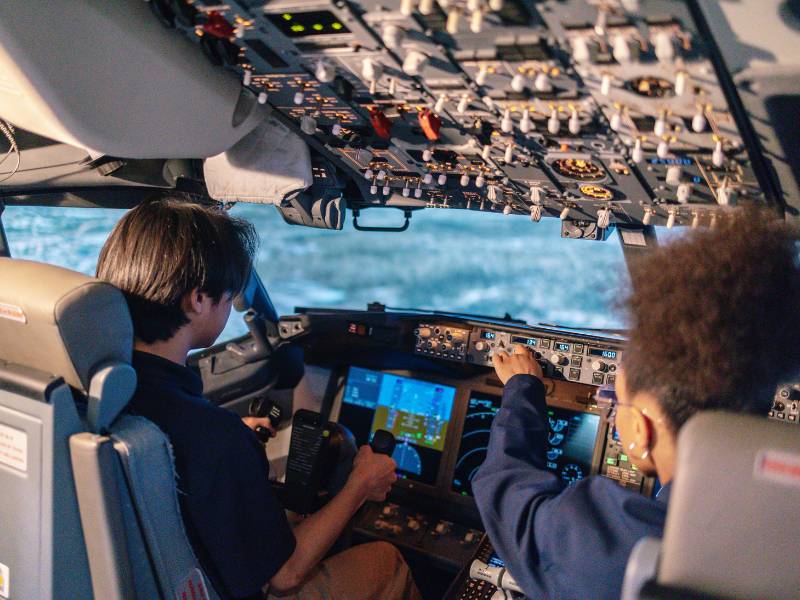From jobs on the ground to careers in the air, the sky’s the limit when it comes to what you can do with an aviation degree. In fact, you may even be able to go beyond the sky if you use your degree to pursue aerospace-related fields!
From working with a private aviation company to commercial airlines or even government organizations, there’s a world of opportunity inside the aviation industry. In order to know which career path to pursue, however, it’s helpful to have an understanding of exactly what jobs are available and what each one entails.
6 Jobs That Are Possible With An Aviation Degree
The truth is, there is a wide variety of careers available to people with an aviation degree. Here’s a list of some of the most common just to give you an idea of what’s possible.
- Private or Commercial Pilot – If you love flying and the idea of being in control of an airplane, this could be the job for you! With the current pilot shortage, this is also a career that’s in high demand. Pilots typically earn a healthy salary and also have the opportunity for career advancement as they gain experience.
- Air Traffic Controller – Maybe taking to the clouds isn’t your thing and that’s okay. The planes in the air need support on the ground, too. An air traffic controller helps organize planes on the ground and in the air so traffic flows smoothly. Another job function is to help reroute planes in the event of equipment malfunctioning or inclement weather.
- Aerospace Engineer – This aviation career involves more than just airplanes. It includes designing, researching, and developing planes, missiles, satellites, spacecraft, and more. Aerospace engineers can work in the commercial sector or even be involved in national defense.
- Aircraft Maintenance Technician – Even the airplanes built with the best design and highest quality parts need to be repaired or at the very least, maintained. That’s the primary function of aircraft maintenance technicians. These important people are ultimately responsible for the safe condition and operation of both private and commercial aircraft.
- Flight Attendant – If you love to travel and enjoy flying but don’t want to be the person doing the flying, this could be a great career for you. Flight attendants are responsible for the safety and comfort of airline passengers and assist pilots and co-pilots with safe operation of each flight.
- Quality Control Personnel – People with a strong interest in accuracy and attention to detail may find the career of quality control specialist a fulfilling one. As airplane parts are manufactured, quality control is necessary throughout the process to ensure safety and accuracy and to make sure the end result meets current standards.
How to Decide Which Aviation Career Is Best For YOU
The list of careers above is only a small portion of what’s available to you with an aviation degree. Before deciding which career path to pursue, it’s important to do your research. Consider things like:
- Job responsibilities – Do you love flying or do you have a passion for numbers, analytics, and organization? These characteristics can influence which career path is right for you. For example, if you’re interested in aviation but afraid of heights, becoming a pilot may not be in your best interest. Instead of taking to the air, you could use your aviation degree to become an airport operations manager – firmly planted on the ground!
- Location – Do you love to travel? Or, are you someone who hates being away from family and loves being home every night? Flight attendants and pilots can lead an adventurous life and see the world, but often have to spend nights away from family and home. Aircraft manufacturing engineers or gate ticketing agents, however, are typically based in one location, have traditional work hours, and don’t need to travel.
- Education – Many aviation careers require further education beyond high school. Some only require an Associate’s degree while others require a Bachelor’s degree in aerospace engineering, aviation, or other related field. Before you choose the occupation you want to pursue, take a look at what type of education is required so you know what to expect.
- Salary – Of course, how much you can earn with an aviation degree is always a big question. And, the answer varies significantly depending on the region in which you work and what type of job you pick. How much you need or want to earn is totally up to you, but make sure you choose an occupation that fits with your expectations.
Get An Early Start On Your Aviation Degree
The aviation industry is a competitive one but there’s no doubt that the need for aviation employees is great. If you already have a passion for all things aviation, why not get started on your career path while still in high school?
At Rising Aviation High School, students go through a unique educational program that focuses on Science, Technology, Engineering, Aviation, and Mathematics (STEAM). This enhanced program, combined with hands-on aviation training, gives students the opportunity to obtain their private pilot or drone pilot’s license while still in high school. They also build a strong foundation in aviation related studies and aviation applications, making them well-suited to go on to pursue an aviation degree.
Located at the Addison Airport (KADS) in Addison, TX, Rising Aviation provides aviation training to students throughout the Dallas metroplex area. If you’re interested in learning more about our aviation programs, contact us today to explore your options.






